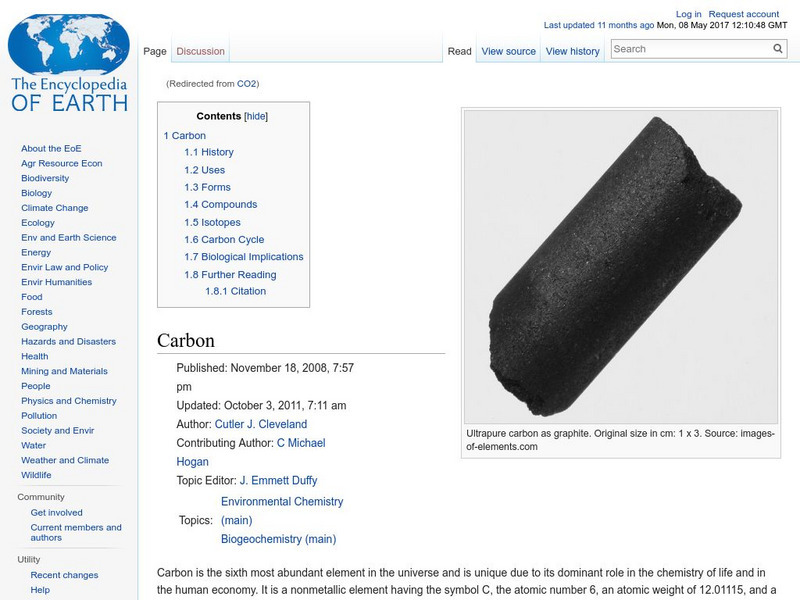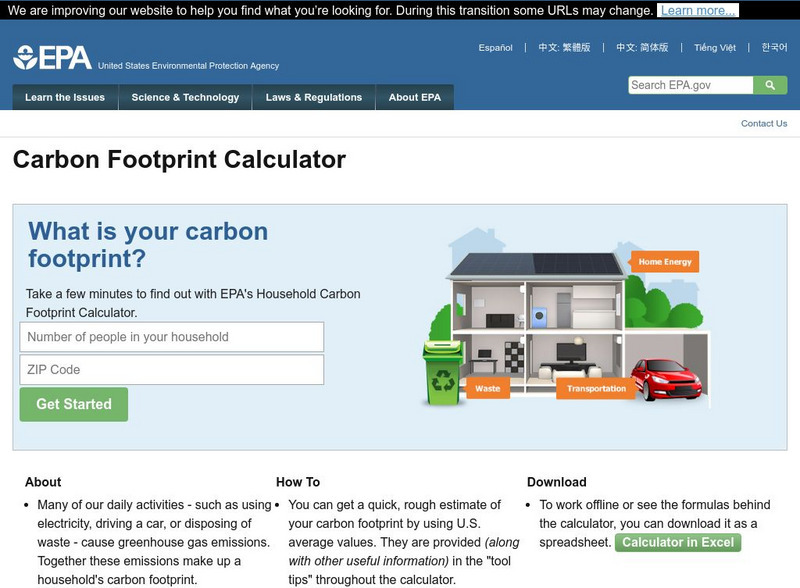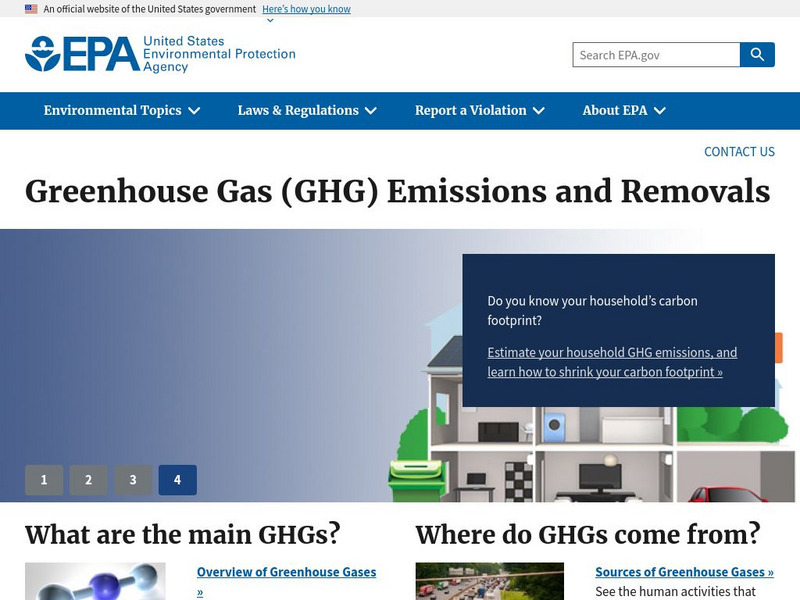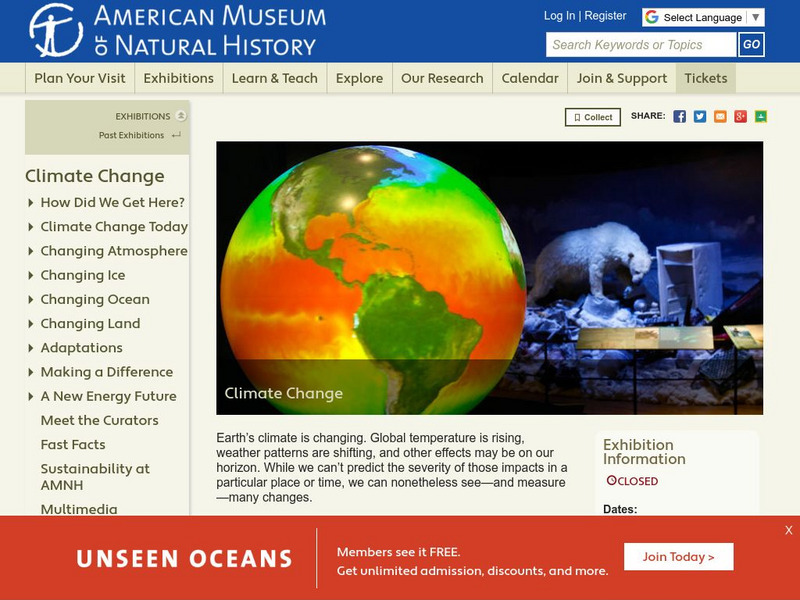Society for Science and the Public
Science News for Students: Carbon Dioxide Levels Rise Fast and High
The buildup of carbon dioxide in the atmosphere is rising faster than at any time since dinosaurs roamed the Earth. The burning of fossil fuels is largely to blame.
Encyclopedia of Earth
Encyclopedia of Earth: Physics & Chemistry: Carbon Dioxide
Explains what carbon dioxide is, where it is found, sources of it, and describes human activities that contribute to carbon depletion and increased levels of carbon dioxide in the atmosphere. (Updated: February 22, 2013)
US Environmental Protection Agency
Epa: Household Carbon Footprint Calculator
Enter your household energy data to find out your family's total carbon footprint. Explore some actions to take to reduce your carbon emissions, and then find out your estimated savings once you take those steps.
Vision Learning
Visionlearning: Earth Science: The Carbon Cycle: What Goes Around Comes Around
Instructional module focusing on the carbon cycle. Discussion includes the biological and geological components of how carbon moves through the atmosphere, lithosphere, and hydrosphere. Site also includes an interactive practice quiz and...
TED Talks
Ted: Ted Ed: Is Our Climate Headed for a Mathematical Tipping Point?
Scientists have warned that as CO2 levels in the atmosphere rise an increase in Earth's temperature by even two degrees could lead to catastrophic effects across the world. But how can such a tiny, measurable change in one factor lead to...
PBS
Pbs Learning Media: Global Climate Change: The Effects of Global Warming
Students conduct an investigation to determine CO2 levels in four different gas samples, examine evidence of global warming in our environment, and consider their own role in contributing to global warming.
PBS
Pbs Teachers: Earth's Warming Climate: Are We Responsible?
We obviously don't want to feel responsible for the warming climate, but are we? In this lesson plan you will analyze CO2 data sets and study barriers involved in teaching about global climate change. PBS TeacherLine also provides a...
NASA
Nasa: Carbon: Where Does It All Go?
At this site from NASA you can understand how phytoplankton help the carbon dioxide levels between the oceans and the air stay in balance.
US Environmental Protection Agency
Epa: Greenhouse Gas (Ghg) Emissions
Earth's atmosphere contains greenhouse gases. Find out what these gases are and where they come from. Also link to other information about how greenhouse gases contribute to climate change.
Texas Instruments
Texas Instruments: Jason: Tropical Forests Cleaning the Air?
Rainforests at the Crossroads: Measure the CO2 level in a bottle that contains spinach leaves when it is exposed to light. Then collect CO2 data and observe the effects of photosynthesis as you add leaves in the bottle.
NOAA
Noaa: Ocean Explorer: Off Base Acidity of Oceans
A student inquiry into properties of the ocean's carbonate buffer system, and how changes in atmospheric carbon dioxide levels may affect ocean pH and biological organisms that depend on calcification.
Other
The Geological Society: Climate Change: Evidence From the Geological Record
In this statement, The Geological Society describes the changes that are happening to the global climate in terms of what evidence has been observed in our geological history. For example, what happened during past events of rapid...
National Geographic
National Geographic: Sources, Sinks, and Feedbacks
Students will learn about how the Earth's carbon cycle works, as they examine the relationship between levels of carbon dioxide and water vapor in the atmosphere and the temperature of the ocean's surface. Includes online student...
NASA
Nasa: Climate Time Machine
Travel through time and explore how the changing climate has affected sea ice, sea level, carbon dioxide levels, and global temperatures. Also, decide whether or not you would be affected if the sea level rose due to warmer temperatures...
PBS
Pbs Learning Media: Prairie Public Education Services Collection
Prairie Public Education Services award winning documentaries on Germans from Russia focus on the rich history of Germans from Russia and their migration to America. Indian Pride, the 13-part cultural magazine, showcases the unique...
Other
Wards Auto: Auto Maker Fuel Economy, Emissions Improvements on Track
Discusses where the automotive industry was at in 2013 in addressing the problem of carbon dioxide emissions. Smaller car manufacturers face more stringent rules than larger models, while auto makers with lower sales volumes have...
Society for Science and the Public
Science News for Students: Climate Change Could Stall Atlantic Ocean Current
When carbon dioxide levels rise, the currents slow, which leads to temperatures dropping because of the lack of water movement. Europe could suffer as a result of this change.
NASA
Nasa: Climate Time Machine
Take a trip in a "time machine" to see a series of pictures that show the how the climate of Earth has been changing. The indicators shown are: sea ice, sea level, carbon dioxide, and global temperature.
American Museum of Natural History
American Museum of Natural History: Climate Change
A complete guide to the planet's climate change, including evidence, causes, effects, and conservation efforts.
Other
Inside the Human Body: The Respiratory System
This site has respiratory system activities and learning games for students at all grade levels.
TED Talks
Ted: Ted Ed: James Balog: Time Lapse Proof of Extreme Ice Loss
In this video, James Balog describes how evidence for glaciers receding due to climate change can be seen through time-lapse photography. [19:20] Includes a brief quiz and a list of additional resources to explore.
Annenberg Foundation
Annenberg Learner: The Habitable Planet: Energy Lab
Try and meet global energy demands by using alternative energy sources while keeping the carbon levels in the atmosphere down to acceptable levels. Simulator includes a data table available for download for student records.
Other
College of Du Page: Energy in an Ecosystem
Ecosystems contain two kinds of commodities: matter (nutrients) and energy. Nutrients cycle through the ecosystem, available for repeated use by organisms. These cycles of use and reuse are called biogeochemical cycles. Energy instead is...
University Corporation for Atmospheric Research
Ucar: Name That Air Pollutant
Students create graphic organizers describing the four major air pollutants regulated by the U.S. Clean Air Act (ground-level ozone, particle pollution, carbon monoxide, and sulfur dioxide) and then identify the pollutants with a...















